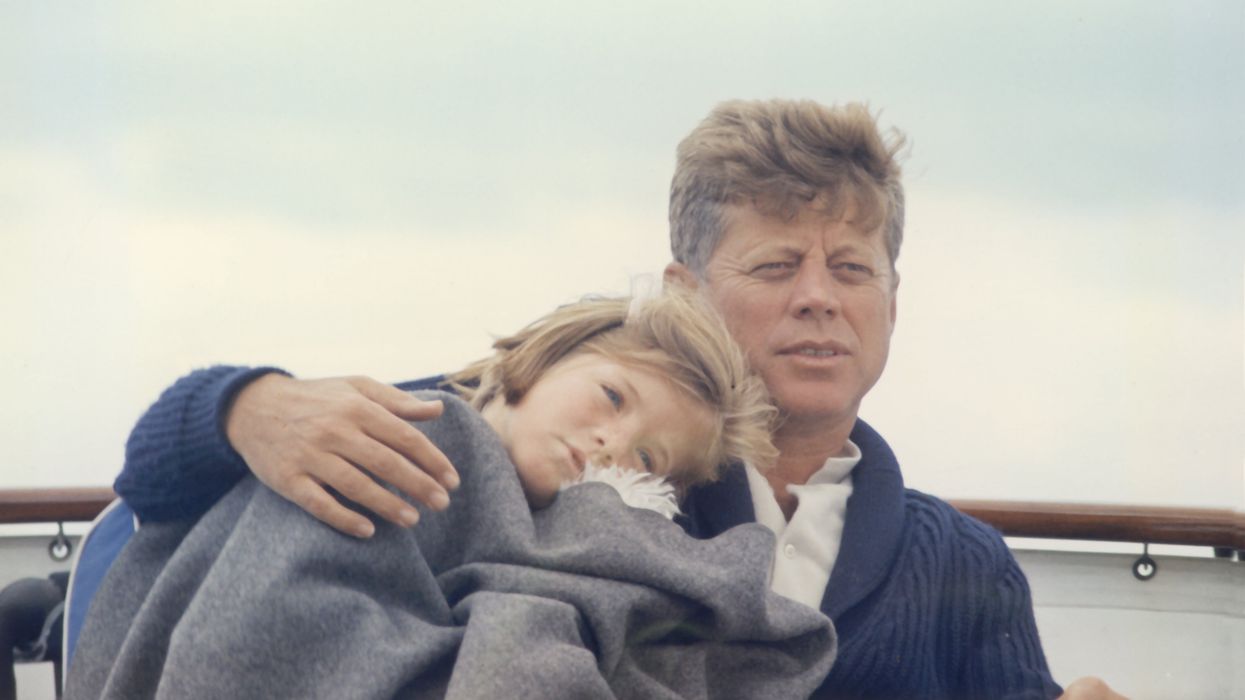Over the Memorial Day weekend, Glenn met a 94 year old farmer who dispensed some very common sense solutions about how to fix the problems facing the country. He told Glenn about his dad, a mule train driver, who would transport supplies across the land. They were tough guys, some weren't even that friendly, but they all lived by one rule: if you saw a man on the side of the road who had a flipped wagon, you helped him reload. And if you stopped and helped, the other driver would give you the chain of bells from the mule in the front of his team. The bells were a symbol for honor, and the only way to get another set of bells was to help another person who was stuck. That's how you got your honor back. The farmer told Glenn that his dad always promised when he left the house that he would be "home with bells on". In other words, he would always return home with his honor. Wouldn't it be a better world if people still lived that way?
From the show:
This weekend, I went out to the Mountain West. I worked on the Man in the Moon, which I’m telling you now, I’ve done a lot of things that have been pretty amazing, but I don’t think I have been part of anything as amazing as the Man in the Moon. I brought some of my team in from New York and from Dallas to see it on Friday, or at least parts of it on Friday, and they all walked away saying, holy cow, I had no idea. It’s pretty amazing.
And then on Saturday, I spent time getting some economic advice from a 94-year-old man. When somebody has lived 94 years and has that kind of life experience, when they talk, you listen, or at least you should. I did. He said, “This is all the economic advice anyone ever needs, Glenn: buy for one, sell for two, and never pay interest.” He felt after pointing that out that he felt it was necessary to also point out that he doesn’t have an economics degree. And then he said, “And if you want fancy advice, you’re going to have to look elsewhere.”
We talked for a couple of hours. He said, “I don’t care what your business is, or how rich you ever become, let me give you this – never throw anything away that can be used for other purposes.” Fancy – no. Wise – yes; pretty much what my grandparents would’ve told me. The answer is always simple. It’s not always easy, but it’s simple. And I think that’s what we have to kind of talk about, because sometimes we get in our own way, and we make things more complicated than they need to be.
We’re constantly told by the media that only the elites with Ivy League educations are qualified to save America, but that’s a lie. The 94-year-old farmer explained some solutions to me using these bells. We spoke for hours, and at many times, both of us had tears in our eyes, especially when he talked about his father. He told me about a man, his dad, who was a wagon freighter in the late 1800s. This is when people were crossing the mountains, and they would have two wagons, and sometimes a grueling, dangerous life would be led behind these mules.
These guys were tough as nails, and they made a living transporting the goods through the rough terrain of the West with as many as 20 mules. I saw a picture of his father. His father came up just below the eyes of the mules. They were huge. And they would haul these giant wagons that were precariously loaded with supplies.
And at various points in the journey, the trails would become extremely hazardous and narrow, in fact, so narrow that when you would come up to a crossroad, if you wanted to turn, you’d have to stop and really listen. And you would be listening for bells. All of the mules would have bells on, and you would listen to hear for those bells.
He told me that sometimes you could hear them for up to three miles, and if you heard them coming towards you, you knew you had to wait, because it was such a narrow trail, once you got onto that road, if someone was coming towards you, you’re both going to be stuck. No two mules could pass each other at the time, and you couldn’t turn the mules around.
Hard living men, the kind of men that would look at the comforts of modern day life with, I think, disgust, not exactly the kind of guy that would hang around and hug their competitors on the trail. But despite all the external toughness, there was something that I think that we miss in today’s world, and it may be the answer to most of our problems – the underwritten rule: If you come across a wagon that is tipped over, whether it belongs to a friend or a mortal enemy, you had to help him.
There were two expressions that this 94-year-old friend of mine gave me this weekend, two expressions that I’d heard a million times, but I didn’t know what they meant. The first one was Yee Haw. You’ve heard – I mean, his kids were like Yee Haw, right? If you said it like that, it’d be very confusing to the mules, because those commands, there’s two of them, Yee and Haw. And the two mules up front knew what they meant.
You see, the best mules were the lead mules, and it was really to keep you on the straight and narrow path. If you started to go up the mountainside a little bit too much, Ha! Ha! or Yee! Yee! And that’s how they steered. You couldn’t go either too far off this, or you’d fall off the cliff, or if you went up too far on the mountain, well, then your wagon would tip, and that was a real mess that you weren’t getting out of easily.
But like I said, if you came across a wagon with the mules, and it had been tipped over, it was your responsibility to help, and not just help get them upright. You also had to reload their wagon. You had to fix any of the broken parts. Whatever they needed, you made it right.
What did you get out of the deal? Nothing – well, in today’s world, nothing, but in their world, a lot. You would get these. These were not the bells that were on the back mules. These bells were only on the front mules. They were the best. And they were from the best mule. They’re not really worth anything of value themselves. This wasn’t for trade or financial gain. The bells were a symbol. They were a symbol of honor.
If you lost your bells, you lost your honor, until you stopped and helped someone else. And then you got their bells. It was all about honor. This hardened 94-year-old farmer welled up like a child when he started talking about his father. Through that weathered exterior, I could still see the pride that he had as he talked about how much honor meant to his father and wondered if it means anything to us now.
He told me whenever his father left on a trip, he would always say the phrase that we have always said but never knew what it meant. He said, “I’ll be home. I’ll come home with bells on.” You see, his mission wasn’t money. It wasn’t really fame. In the end, it was to return home with honor. That’s what we’re missing today.
But the best part is we don’t need to have fancy economics degrees from Harvard to fix it. We just have to get up every morning and put on our pants and our shoes and on the way out the door tell our wife and our kids you’ll be home for dinner with bells on.











